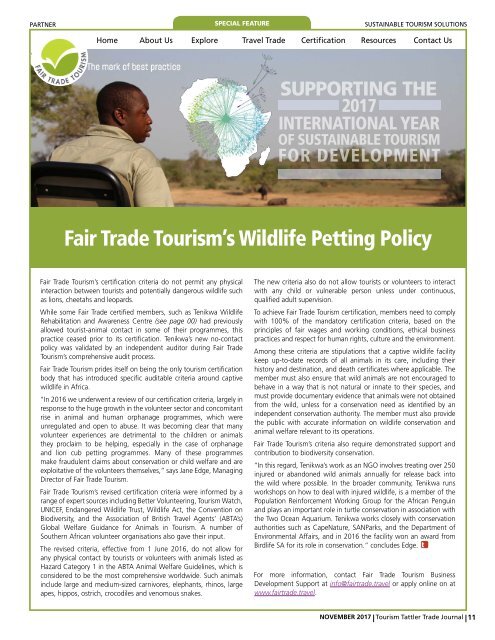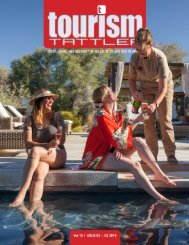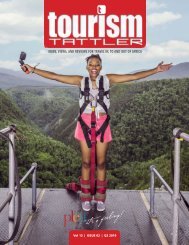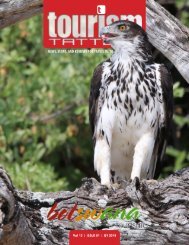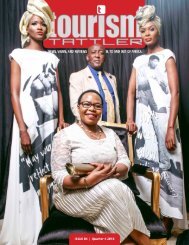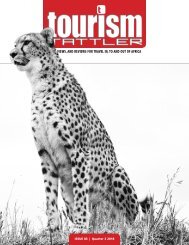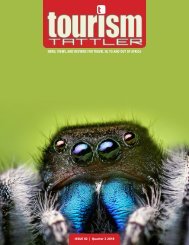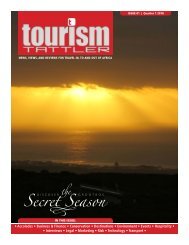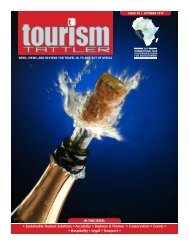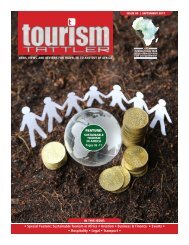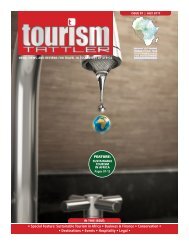Tourism-Tattler-November-2017
The November edition front cover features South Africa’s Minister of Tourism, Tokozile Xasa inducting Esther Mahlangu - South Africa’s world-renowned Ndebele artist and industrial design trailblazer - into the Lilizela Hall of Fame. See all the 2017 award winners on pages 12-19.
The November edition front cover features South Africa’s Minister of Tourism, Tokozile Xasa inducting Esther Mahlangu - South Africa’s world-renowned Ndebele artist and industrial design trailblazer - into the Lilizela Hall of Fame. See all the 2017 award winners on pages 12-19.
You also want an ePaper? Increase the reach of your titles
YUMPU automatically turns print PDFs into web optimized ePapers that Google loves.
PARTNER<br />
SPECIAL FEATURE<br />
SUSTAINABLE TOURISM SOLUTIONS<br />
Home About Us Explore Travel Trade Certification Resources Contact Us<br />
SUPPORTING THE<br />
<strong>2017</strong><br />
INTERNATIONAL YEAR<br />
OF SUSTAINABLE TOURISM<br />
FOR DEVELOPMENT<br />
Fair Trade <strong>Tourism</strong>’s Wildlife Petting Policy<br />
Fair Trade <strong>Tourism</strong>’s certification criteria do not permit any physical<br />
interaction between tourists and potentially dangerous wildlife such<br />
as lions, cheetahs and leopards.<br />
While some Fair Trade certified members, such as Tenikwa Wildlife<br />
Rehabilitation and Awareness Centre (see page 00) had previously<br />
allowed tourist-animal contact in some of their programmes, this<br />
practice ceased prior to its certification. Tenikwa’s new no-contact<br />
policy was validated by an independent auditor during Fair Trade<br />
<strong>Tourism</strong>’s comprehensive audit process.<br />
Fair Trade <strong>Tourism</strong> prides itself on being the only tourism certification<br />
body that has introduced specific auditable criteria around captive<br />
wildlife in Africa.<br />
“In 2016 we underwent a review of our certification criteria, largely in<br />
response to the huge growth in the volunteer sector and concomitant<br />
rise in animal and human orphanage programmes, which were<br />
unregulated and open to abuse. It was becoming clear that many<br />
volunteer experiences are detrimental to the children or animals<br />
they proclaim to be helping, especially in the case of orphanage<br />
and lion cub petting programmes. Many of these programmes<br />
make fraudulent claims about conservation or child welfare and are<br />
exploitative of the volunteers themselves,” says Jane Edge, Managing<br />
Director of Fair Trade <strong>Tourism</strong>.<br />
Fair Trade <strong>Tourism</strong>’s revised certification criteria were informed by a<br />
range of expert sources including Better Volunteering, <strong>Tourism</strong> Watch,<br />
UNICEF, Endangered Wildlife Trust, Wildlife Act, the Convention on<br />
Biodiversity, and the Association of British Travel Agents’ (ABTA’s)<br />
Global Welfare Guidance for Animals in <strong>Tourism</strong>. A number of<br />
Southern African volunteer organisations also gave their input.<br />
The revised criteria, effective from 1 June 2016, do not allow for<br />
any physical contact by tourists or volunteers with animals listed as<br />
Hazard Category 1 in the ABTA Animal Welfare Guidelines, which is<br />
considered to be the most comprehensive worldwide. Such animals<br />
include large and medium-sized carnivores, elephants, rhinos, large<br />
apes, hippos, ostrich, crocodiles and venomous snakes.<br />
The new criteria also do not allow tourists or volunteers to interact<br />
with any child or vulnerable person unless under continuous,<br />
qualified adult supervision.<br />
To achieve Fair Trade <strong>Tourism</strong> certification, members need to comply<br />
with 100% of the mandatory certification criteria, based on the<br />
principles of fair wages and working conditions, ethical business<br />
practices and respect for human rights, culture and the environment.<br />
Among these criteria are stipulations that a captive wildlife facility<br />
keep up-to-date records of all animals in its care, including their<br />
history and destination, and death certificates where applicable. The<br />
member must also ensure that wild animals are not encouraged to<br />
behave in a way that is not natural or innate to their species, and<br />
must provide documentary evidence that animals were not obtained<br />
from the wild, unless for a conservation need as identified by an<br />
independent conservation authority. The member must also provide<br />
the public with accurate information on wildlife conservation and<br />
animal welfare relevant to its operations.<br />
Fair Trade <strong>Tourism</strong>’s criteria also require demonstrated support and<br />
contribution to biodiversity conservation.<br />
“In this regard, Tenikwa’s work as an NGO involves treating over 250<br />
injured or abandoned wild animals annually for release back into<br />
the wild where possible. In the broader community, Tenikwa runs<br />
workshops on how to deal with injured wildlife, is a member of the<br />
Population Reinforcement Working Group for the African Penguin<br />
and plays an important role in turtle conservation in association with<br />
the Two Ocean Aquarium. Tenikwa works closely with conservation<br />
authorities such as CapeNature, SANParks, and the Department of<br />
Environmental Affairs, and in 2016 the facility won an award from<br />
Birdlife SA for its role in conservation.” concludes Edge.<br />
For more information, contact Fair Trade <strong>Tourism</strong> Business<br />
Development Support at info@fairtrade.travel or apply online on at<br />
www.fairtrade.travel.<br />
NOVEMBER <strong>2017</strong> <strong>Tourism</strong> <strong>Tattler</strong> Trade Journal 11


